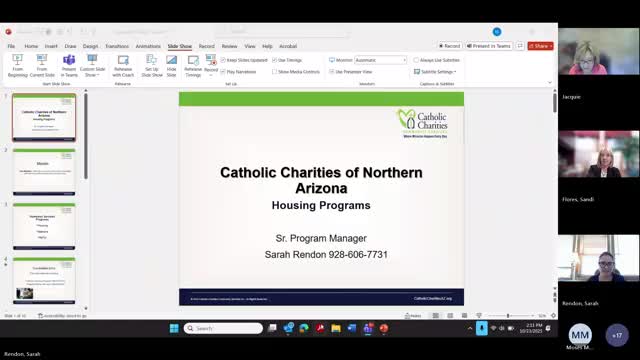Catholic Charities outlines expanded housing, reentry and rapid-rehousing programs across northern Arizona
Get AI-powered insights, summaries, and transcripts
Subscribe
Summary
Sarah Rendon of Catholic Charities presented an overview of the organization’s housing and homeless services in northern Arizona, including permanent supportive housing units, rapid rehousing, community reentry homes, family shelter and a hotel-to-housing conversion in Page. Commissioners raised concerns about potential funding shifts away from "H
Sarah Rendon, program staff for Catholic Charities in Northern Arizona, briefed the Flagstaff City Housing Commission on the organization’s current housing programs and partnerships across the region, including expanded services into Navajo and Apache counties and a hotel-to-housing conversion in Page.
Rendon said Catholic Charities operates a range of programs: permanent supportive housing (PSH) units for people with long-term homelessness and disabilities, rapid rehousing with short-term rental assistance, community reentry homes for people exiting the justice system, family shelter units, eviction-prevention and diversion programs, and the H2O (Housing and Health Opportunities) program funded by Access and administered through Solari. She described case management, behavioral-health partnerships and coordinated entry as core components of Catholic Charities’ approach.
Key program figures Rendon provided: about 50 permanent supportive housing units in Coconino County and roughly 125 PSH units across Northern Arizona; seven community reentry homes regionwide (four in Coconino County, including three in Flagstaff and one in Page); two family shelters (one in Flagstaff, one in Bullhead City) with up to three families each for up to 90 days; and a 20-unit hotel-to-housing conversion in Page known as Pinion Point that serves families and individuals for up to two years with onsite staffing.
Rendon described diversion and rapid resolution tools used to keep households stably housed when possible, and the Garcia Family Foundation as a one-time funding source used to help families on a community “by-name” list avoid entering the homeless system.
Commissioner Sandy Flores — who also works professionally in Catholic Charities’ housing programs — warned the commission about shifting funding priorities at the Continuum of Care level and state contracting that could reduce Housing First and permanent supportive housing investments. Flores said, “Housing First is threatened right now,” and urged commissioners and staff to be attentive to contracting changes that could affect program models and clients.
Council Member Cara House, the council liaison to the commission, praised the presentation and recommended a reentry simulation exercise for commissioners and staff to gain perspective on challenges faced by justice-involved and behaviorally vulnerable residents seeking housing and services.
Rendon said Catholic Charities continues to coordinate with Path outreach teams, Flagstaff Shelter Services and other partners to conduct coordinated entry and case conferencing, and emphasized that services and program offerings evolve with funding availability and local needs.
